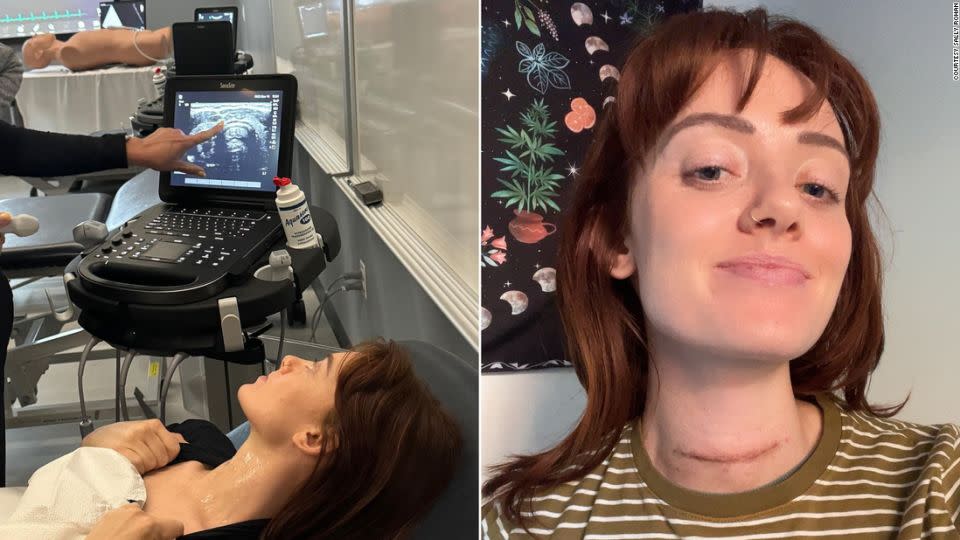A first-year medical student was learning about ultrasounds. She found something unexpected about her own health
With a pink, week-old surgical wound etched across a few inches of her neck, medical student Sally Rohan said somehow, she’d never had a scar until now.
“This is my first,” Rohan, a second-year medical student at the New Jersey-based Rowan-Virtua School of Osteopathic Medicine, told CNN on Thursday. “I don’t know how I’ve gone through life so unscathed that I’ve never had a scar until it was this massive one on my neck at 27 (years old).”
Rohan, originally from Ukiah, California, had an operation on December 6 to remove her entire thyroid gland after a class about ultrasounds alerted her to what was later diagnosed as thyroid cancer, she said.
As a first-year medical student in November 2022, when she was 25, Rohan made the accidental discovery while acting as a patient in class. She and her classmates were learning how to use ultrasound to examine the thyroid, according to Rohan.
“We practice by getting on the beds and doing it to each other in little groups, so I got on the bed and my friend then held up the probe, and we were looking at my thyroid,” Rohan said.
Able to view the monitor herself, Rohan recalled seeing her own thyroid appear to be “all bumpy,” she said.
“‘What’s going on? The tissue doesn’t look the way that it looked in the videos that we watched before this class,’” Rohan remembered saying.
An instructor identified what Rohan saw as a nodule and recommended a checkup from her primary care doctor.
“Because we’re at a medical school, (she) sent it to Student Health just to see what they thought,” Rohan said.
She was advised again to check with her doctor, but at the time, she was less than three weeks from turning 26, when she would be dropped from her parents’ health insurance in California.
“I had a plan for how to get onto New Jersey health insurance, but I didn’t realize how long it was going to take,” Rohan said.
Her doctor in California said they would order blood work but recommended waiting until she was again insured to receive diagnostic imaging and a more thorough look at her thyroid.
Meanwhile, school took priority. Rohan said she hadn’t been too concerned after being told her thyroid levels were normal and thyroid cancer “is not that bad,” she said.
The five-year relative survival rate of papillary thyroid cancer, with which Rohan was later diagnosed, is over 99%, according to the American Cancer Society. Her family did not have a history of thyroid cancer, she added.
“I don’t think (my doctor) meant (for me to) wait a whole year, which is what I ended up doing,” she shared.
Looking for answers
Rohan said she finally got an ultrasound after securing health insurance and a new primary care doctor a couple of months ago.
She was playing pickleball with friends when she got a notification of a new message in her medical records app, she said.

“The radiologist had looked at my ultrasound and said, ‘she has several nodules in her thyroid and it looks like cancer, and it looks like the cancer has metastasized bilaterally to her cervical lymph nodes,’” Rohan recounted.
The message scared her.
“Even in that moment, I was like, ‘OK, it’s thyroid cancer, people don’t usually die from that,’” Rohan said. “But I didn’t really think, ‘what if it moves around? Like, what if it spread elsewhere?’”
After quickly scheduling a biopsy appointment with the help of a doctor from her medical school, the feeling of being grateful she was closer to getting some answers outweighed her fear of what was to come, Rohan said.
Following the biopsy, which confirmed it was likely cancer, she said she scheduled a surgery with a specialist experienced in thyroid and adrenal gland surgeries.
“She was amazing and worked with my school schedule so that I could take some time off, but also not have to get behind if I didn’t want to,” Rohan said.
She cannot yet say she is fully free of the disease, and Rohan said she’ll need to continue taking a thyroid hormone to make up for the missing gland.
“I don’t think anyone wants to get my hopes up,” she said. “When they were doing the lateral neck dissection to get the cancer out of my lymph nodes, they found more than they thought they would, which was unexpected.”
Rohan said she believes her cancer experience will shape the way she’ll serve her patients when she becomes a doctor.
“I think it’ll give me a lot more empathy,” she said. “I think it’s making me a more empathetic person in general, but also as a future physician, definitely.”
For more CNN news and newsletters create an account at CNN.com


